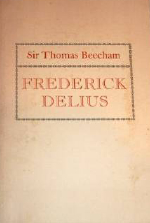Frederick Delius
Last updated: 17.12.19

| Printed: | 1973 | Author: | Thomas Beecham |
| Publisher: | Broude Brothers Ltd | ISBN: | 0844300829 |
| Suppliers: | 



|
Usually ships within 2-3 days.
Amazon Review:
PYRRHONISTS.
Some biographies, notably Boswell's life of Johnson, are as interesting on account of the biographer as because of the subject. For me, Beecham's biography of Delius is very definitely in this category. Beecham was not greatly in sympathy with English music (unless you count Handel), but as a young man he had been 'electrified' (his own word) on first hearing Delius. The association that developed between an interpreter universally acknowledged as great in his field and a composer whose stature is still subject to discussion has no parallel that I can think of. They became close companions as well as artistic colleagues, and Beecham delivered the funeral eulogy on the friend whose inspiration had done so much to set his own alight. The composer's widow had first suggested such a book to Beecham, perhaps with slightly unrealistic expectations as to what it might consist of. Bereaved companion and wholehearted admirer Beecham might have been, but, in a highly characteristic sentence, Beecham finally went about the task long after the death of Jelka Delius in the conviction that `the temptation to burden Frederick with a load of highly undesirable virtues must be sternly resisted.
In fact Beecham skates delicately around the two most notorious aspects of his subject's life - his death from syphilis and his highly suspect belief in some species of Caucasian supremacy. Regarding the latter, Beecham offers his own belief that Delius had no really coherent philosophical outlook other than a wholesale contempt for and rejection of religion. This world-view Beecham terms `Pyrrhonism', and it takes no great reading between the lines to sense that it was an outlook that he shared, albeit from a more worldly and tolerant standpoint. I myself share entirely Beecham's opinion that the Mass of Life, to poetry by Nietzsche, is Delius's greatest composition, while reserving judgment as to whether it can legitimately be compared with Bach's B minor Mass. I am much clearer that neither the text nor the music have any political dimension whatsoever, and that this great work can certainly stand alongside Mahler's eighth symphony. As regards the affliction that brought Delius to physical ruin, I suppose it would take Beecham to describe it as the way in which Aphrodite Pandemos repaid her devotee in his younger days, and in general Beecham is very brief and summary regarding Delius's relations with women.
Nobody, I suppose, was in as good a position as Beecham was to portray his friend in detail. He makes reference to such earlier biographical studies as then existed, notably the hagiographical production of Philip Heseltine, the composer Peter Warlock, a work that Beecham characterises as "juvenile", and indeed Heseltine was a lifelong juvenile. His own study is affectionate and closely observed, with Beecham's characteristic humour and wit in the description of Delius's manner of speaking, with a Yorkshire accent overlaid with strange locutions deriving from the polyglot composer's long absences from England or America in Scandinavia, Germany and France. One respect in which this book is particularly enlightening is the account of Delius's financial history, a matter in which Beecham, himself the son of an industrial magnate in northern England, has the background and experience to know what he is talking about.
Beecham explicitly disavows any intention of offering a critical study of Delius's music, but you can take that with more than a pinch of salt. As you would expect, he does not subject us to any tedious catalogue raisonne, but the compositions are discussed seriatim as the composer produced them. My own grasp of the music of Delius is a lot better than it was just a few years ago, and not before time either, and I was enthralled to read Beecham's insights and check them against my own provisional views. As when he discusses his subject personally, Beecham is sympathetic but far from uncritical towards the music, and I have been left with a great deal to ponder as regards not only individual compositions but the oeuvre of Delius taken as a whole, not to mention some enlightening and often highly entertaining reflections on contemporary music generally. From Beecham's standpoint in the late 1950's I seemed to get a picture of Delius as a potential rival to Strauss in popularity, and I'm far from sure that this is the impression I have today. Delius is known mainly from some smaller orchestral bonbons, and it seems to me that he has not really made a universal breakthrough as Strauss has. I have certainly come round to the view that Delius is fully of the stature of Strauss or Mahler, and I certainly share Beecham's hope that his stature will someday be fully appreciated, but what the odds are against this outcome I would not like to guess.
As a writer Beecham is nothing short of superlative. His style is aloof, Augustan and elegant, with a consciously old-fashioned persona projected to disguise the impish wit that was a famous trait of this great musician. Whether Delius will finally `make it' as he fully deserves I simply do not know. He has made it so far as I am concerned, and probably no composer benefits as he has done from a biography of the quality of this. I can only observe, all the same, that not only has the quality of the music failed to impress all listeners to the extent it has me, but that this outstanding biography is only now receiving its first review on this august website. May times change.

